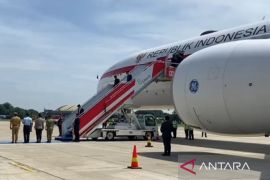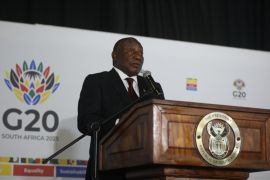Jakarta (ANTARA) - Indonesia’s G20 Presidency is expected by many parties to serve as a catalyst for the country’s economic revival.
Besides presenting opportunities for jobs and investment, the international event is also expected to open more doors for local MSMEs (micro, small, and medium enterprises) to export their products.
MSMEs have become a focus because of their significant role and contribution to the national economy amid the COVID-19 pandemic. Thus, the momentum of the G20 Presidency should help MSME actors to work on opportunities to go global, analysts said.
For this reason, various efforts, especially collaborations, are needed to encourage MSMEs to make the most profit economically, they added.
Director of the integrated financial services sector policy group (GKKT) of the Financial Services Authority (OJK) and deputy for the sharia and MSME task force, Greatman Rajab, said one of the important roles of MSMEs in Indonesia’s economy is in non-oil and gas exports, which have reached 15.65 percent of total exports nationally.
Therefore, the OJK is continuing to support the development of the MSME ecosystem, which includes the fashion, culinary, horticulture, creative economy, furniture, and livestock sectors, so that they can become export priorities, he added.
Furthermore, Rajab stressed that MSMEs must take advantage of the G20 Presidency to boost business opportunities in the green sector.
The COVID-19 pandemic has served as a wake-up call for the transition to a green economy as a new source of sustainable and environmentally friendly economic growth, he said. Green economy can be a part of the National Economic Recovery (PEN) program, he added.
Data from the 2020 World Economic Forum has shown that the green transition can generate business opportunities worth US$10.1 trillion and create 395 million jobs by 2030, he said. Thus, it is expected to encourage the creation of new business opportunities (green jobs) for MSMEs, including millennials, he added.
Similarly, deputy head of the small and medium enterprise (SME) division at PT Bank Negara Indonesia (Persero) Tbk (BNI), Yessy Aktaina, said that MSMEs are increasingly playing an essential role in the national economy.
For that reason, she deemed it necessary to continue to encourage them to go international or export their products. She emphasized that BNI’s current focus is helping Indonesia’s MSMEs to level up.
Aktaina highlighted the necessity for collaboration between institutions for developing MSMEs so that they can advance. According to her, Indonesia’s MSMEs have great potential. However, they are currently facing problems related to access that need to be resolved through regulations or programs from institutions, she added.
Halal Products
Meanwhile, general chairperson of INTANI (Indonesian Farmers and Fishermen's Association) and Special Staff Assistant to the Vice President, Guntur Subagja, noted that MSME participation in the halal industry is not yet high.
As a country with the largest Muslim population globally, Indonesia has the potential to become a producer in the halal industry, which is currently dominated by Brazil, the US, India, Russia, and China, he said.
In order to catch up, the Indonesian government is collaborating with business players who are part of the Indonesian Export Digital Platform Association (PD Export) by building an export ecosystem for MSME halal products, "Global Halal Hub Indonesia,” he added.
Currently, 99 percent of MSMEs are making a significant contribution to Indonesia's economic structure, he said. Around 23.9 percent of MSMEs are utilizing digital platforms, and 14 percent of MSMEs have penetrated the export market, he pointed out.
With consumer spending reaching US$184 billion in 2020, Indonesia has been listed as the world's largest halal consumer market, he noted.
According to the State of Global Islamic Economy (SGIE) Report 2020/2021, exports of halal products by Indonesia reached US$8 billion, while imports touched US$10 billion during the period.
In addition, an investment of US$5 billion flowed into the Indonesian halal sector. This has emphasized that Indonesia is a very large market, Subagja said.
Managing director of the export hub, Amalia Prabowo, highlighted the importance of e-commerce expert human resources in Indonesia.
According to her, Indonesia needs more e-commerce experts to push MSMEs’ participation in the export market.
She cited the example of Singapore, which is earning an income by buying goods from Indonesian MSMEs and selling them again on global e-commerce platforms.
Prabowo emphasized that the shared goal of MSME activists is to push B2B exports.
Data from Alibaba and Amazon have shown that B2B e-commerce has increased six times compared to B2C, she added.
Positive Growth
Deputy for micro-enterprises at the Ministry of Cooperatives and SMEs, Eddy Satriya, said that Indonesia's economy managed to grow positively in the second and third quarters of 2021 amid an increase in COVID-19 cases due to the spread of the Delta variant in July the same year. In fact, fourth-quarter growth led Indonesia's annual economy to grow positively again, he noted.
In 2021, through the National Economic Recovery (PEN) program, the government supported MSMEs with a budget allocation of Rp96.21 trillion, he noted. Of the total, Rp83.19 trillion has been realized, he said.
Meanwhile, in 2022, the government has allocated a PEN fund of Rp451.64 trillion in total, of which Rp174.87 trillion will be allocated for the strengthening of economic recovery, he added.
Deputy for coordination of digital economy of employment and MSMEs at the Coordinating Ministry for Economic Affairs, Rudy Salahuddin, said that MSMEs are key for economic recovery.
According to him, MSME players are a critical engine for Indonesia's economy, considering that their contribution to the GDP (gross domestic product) has reached 60.51 percent, with labor absorption reaching 96.92 percent.
MSMEs also have a role in boosting Indonesia’s investment and exports, he said. The total investment in the MSME sector has reached 60 percent of the total national investment, he noted. Its contribution to national non-oil and gas exports has reached 15.65 percent, he added.
Head of the Government Procurement of Goods and Services Agency (LKPP), Abdullah Azwar Anas, expressed the hope that MSMEs would play a more significant role in government procurement tenders.
He proposed that as many as 1 million MSME products be included in the e-catalog of government procurement. Currently, 150,339 products have been registered, and by March 2022, it is targeted that there will be 200 thousand products, he said. Then, by the end of the year, 2 million products are expected to be registered, he added.
MSMEs are expected to make the most of Indonesia’s G20 Presidency during this year to become drivers of Indonesia’s economic recovery and go global, he said. (*)








